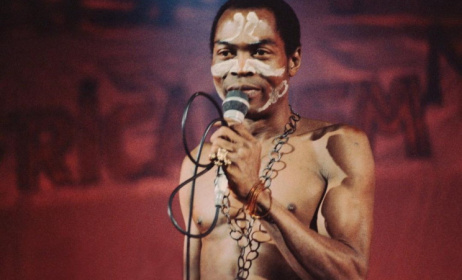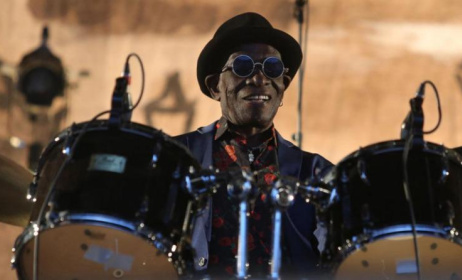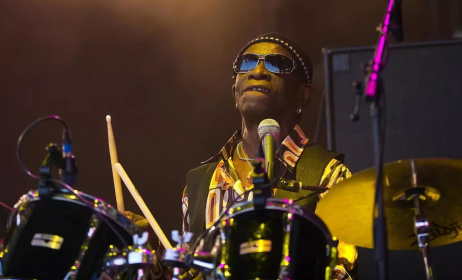10 Questions for Afrobeat band Kokoroko
The Afrobeat band Kokoroko is based in the UK. Comprised of a group of young people, some of whom have Nigerian descent, the band is finding its way in the UK live scene. Music in Africa's West African English editor Oris Aigbokhaevbolo spoke with Kokoroko's percussionist Onome Edgeworth via email.
 Afrobeat band Kokoroko sharing a laugh. Photo: OE
Afrobeat band Kokoroko sharing a laugh. Photo: OE
1. Let's start with origins. How did the band come together?
Sheila and I (Onome) were in Kenya and I was moaning about a band I’d seen playing Afrobeat in London. The vibe was weird, the crowd were not really engaging. Music I grew up with was being treated badly, and West africans were seriously underrepresented, there were very few black people there, on stage or in the audience. Sheila had experienced the same. She’s a doer though—she got together a bunch of musicians and Kokoroko was born.
2. What drew you to the music?
It’s great music. Not just Afrobeat—West Africa was always rich with music and Fela is a lot of people's entry point. He studied at the Trinity Laban, where a few of the guys in the band studied, so his influence is strong, especially with how political his music is.
I think what stands out most though is the level of musicianship on a lot of the records that came out of West Africa in the 20th century. People were really playing. They make you listen and often your body just moves to them. I always wanted to play music like this, and I think it felt natural to all of us.
3. The band's name has Origins in Delta state, Nigeria, and your music is Afrobeat as created by Fela. Are there any direct Nigerian connections for the group and as individuals in the band?
Yes! Our percussionist is Urhobo and two drummers and saxophonists are also Nigerian. I think our guitarist might be too cause he’s so much hassle—but he swears he’s full English.
4. Kokoroko Band has an all-female horn section doing music by Fela, who to some was not particularly feminist. Is the horn section a political statement or a musical one?
Our horn section were picked because they’re badass musicians! They also all happen to be women and we are often told how empowering people find this because there is a major gender imbalance in this industry. We need more women like them and we really believe in creating change whilst we’re here. Fela definitely wasn’t a perfect man—but what we’ve learnt from him is a way to use our voice and platform. Speaking up is a big part of his legacy.
5. What is the band’s favourite Afrobeat song?
Big question. Let’s say 'Lady' by Fela. I remember my mother playing that record throughout my childhood. I’ve heard some interesting feminist reflection on it, but it was a serious household anthem.
6. Going by videos online, a portion of your audience is white. Does the band worry that it might be seen as a trendy hipster fascination?
I’m sure we have benefited from some form of fascination. The first thing people see is three black women playing horns and it's a striking, rarely seen image. The truth is live music in London attracts a largely white crowd, especially in the Jazz and African music scene. London is a beautifully diverse city and while we’ve had some weird comments, probably borne through this fascination, we’ve also been massively supported by a community of people who enjoy and support African music.
We want more diverse crowds though—representative of us and our city. We are seeing more and more black faces at our shows and it’s beautiful and reassuring. That was always our goal—get our community enjoying all of our music tradition. We were worried, but they are coming now!
7. Does Kokoroko have original compositions in the Afrobeat genre?
We’ve been writing. We are performing a lot of them at the moment and letting them grow naturally. You don’t know if a song works until you see how the crowd responds. It’s not only Afrobeat though. We are Londoners, and our influences come out a lot. London has great music culture—jazz, dance music, soul—and I’m sure in some ways this will find it’s way into our sound.
8. Several contemporary Nigerian pop acts have taken Afrobeat and while the sound remains fresh, many pop acts have added various elements to it. Would Kokoroko stick to pure Afrobeat or is there a chance for fusion?
I think fusion is important. You have to keep with the times and it’s a great way to get people to look backwards. We spent our first year just playing older Afrobeat and highlife songs, but now that we’re writing we’ll be drawing from all our influences. We focus on instrumentation and content. We want people to dance and take something real from the shows. But we will always pay homage to the greats.
9. Are there any plans to record an album? Or will this continue to be an exclusively live band?
We’re recording now—we should be ready to release by the end of summer. You know coordinating eight or nine is hard, but we are getting there. We’re really happy with how it's all sounding and have some great people supporting us. It’s very exciting
10. We have the New Afrikan Shrine in Lagos, which hosts Felabration yearly. We also have several other spots for live music. Would we be having you guys come play soon?
That’s a dream! My mum used to tell me about the New Afrikan Shrine and I’m yet to go. It would be great for us all to get out to Lagos and play. We’re ready!
For more information on Kokoroko, visit the band's website.
























Commentaires
s'identifier or register to post comments